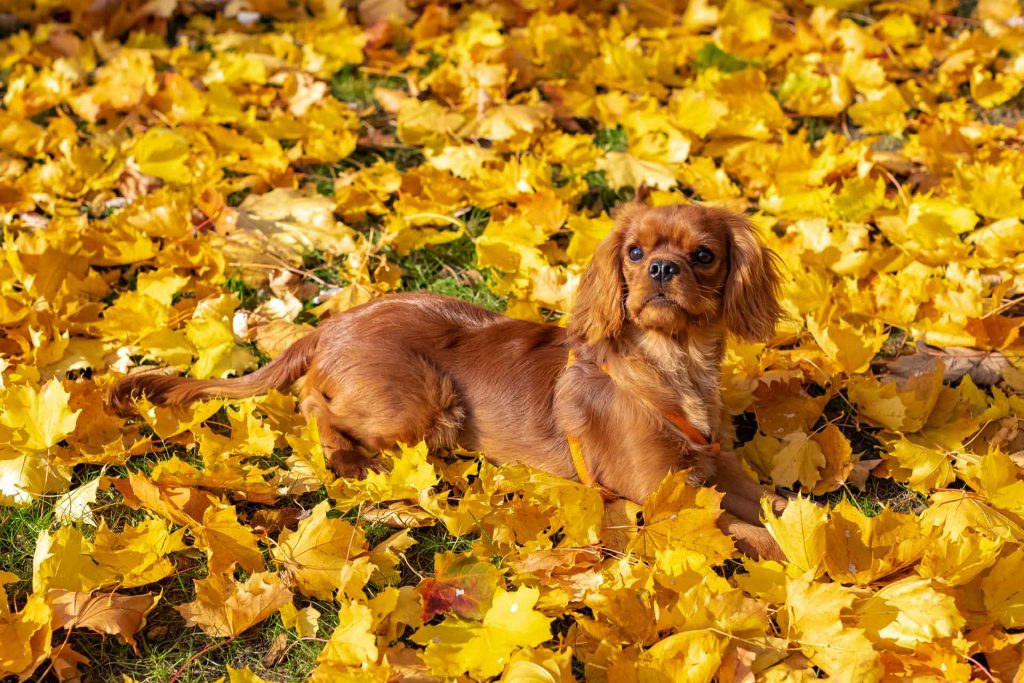
Autumn can be a lovely time of year, but brings with it a variety of issues which can affect our little cavaliers. Here is a list of some things to be aware of.
Harvest Mites
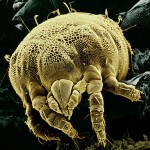 These tiny orange mites emerge about now. These seasonal parasites are picked up from long grasses and tend to congregate on the ears, eyelids, feet and even underside of your pet’s tummy. Like fleas, these mites can cause intense itchiness, and with cavaliers having sensitive skin, it is important to keep flea and mite protection up to date all year round.
These tiny orange mites emerge about now. These seasonal parasites are picked up from long grasses and tend to congregate on the ears, eyelids, feet and even underside of your pet’s tummy. Like fleas, these mites can cause intense itchiness, and with cavaliers having sensitive skin, it is important to keep flea and mite protection up to date all year round.
Conkers
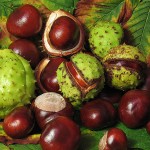 Conkers (raw horse chestnuts) are also a hazard as they contain a variety of potentially toxic active chemicals, so are best avoided. If eaten, symptoms – vomitting and muscle spasms – can develop rapidly within 6 hours of ingestion, but thankfully most dogs will recover just as quickly. Fatal conker poisoning is rare as a large quantity of conkers would need to have been eaten and as the seeds are unpalatable this acts as a deterrent, but if you do suspect your cavalier has eaten conkers make sure you give plenty of fluids and seek veterinary advice as soon as possible.
Conkers (raw horse chestnuts) are also a hazard as they contain a variety of potentially toxic active chemicals, so are best avoided. If eaten, symptoms – vomitting and muscle spasms – can develop rapidly within 6 hours of ingestion, but thankfully most dogs will recover just as quickly. Fatal conker poisoning is rare as a large quantity of conkers would need to have been eaten and as the seeds are unpalatable this acts as a deterrent, but if you do suspect your cavalier has eaten conkers make sure you give plenty of fluids and seek veterinary advice as soon as possible.
Fireworks
 Now is also the time to start planning for the upcoming firework season. There are a range of desensitization CDs which can help with firework phobias, and do seem to be an effective way of preparing some anxious cavaliers. Sedatives from your vet are also an option as a last resort, and of course, always keep dogs indoors in the evenings to avoid firework injuries.
Now is also the time to start planning for the upcoming firework season. There are a range of desensitization CDs which can help with firework phobias, and do seem to be an effective way of preparing some anxious cavaliers. Sedatives from your vet are also an option as a last resort, and of course, always keep dogs indoors in the evenings to avoid firework injuries.
Antifreeze and Other Poisons
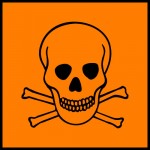 Poisons – Antifreeze, commonly used in car radiators by owners preparing their cars this time of year, is a very tasty and alluring liquid to our inquisitive dogs, but extremely poisonous. If ingested, even small amounts will cause serious irreversible kidney damage and usually death. Likewise, Rodent poisons, put out to stop mice and rats flocking indoors to find warmer surroundings, may also be fatal to your dog. There are four different types of poison and each has the potential to kill your pet: anticoagulants, cholecalciferol, bromethalin, and phosphides, so please be extra aware of these. Any sign of poisoning MUST be treated immediately by a vet.
Poisons – Antifreeze, commonly used in car radiators by owners preparing their cars this time of year, is a very tasty and alluring liquid to our inquisitive dogs, but extremely poisonous. If ingested, even small amounts will cause serious irreversible kidney damage and usually death. Likewise, Rodent poisons, put out to stop mice and rats flocking indoors to find warmer surroundings, may also be fatal to your dog. There are four different types of poison and each has the potential to kill your pet: anticoagulants, cholecalciferol, bromethalin, and phosphides, so please be extra aware of these. Any sign of poisoning MUST be treated immediately by a vet.
Chocolate
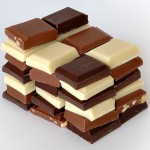 Everyone knows that chocolate is toxic to dogs, especially the dark variety, but so too are raisins and the sugar-free sweetener xylitol. Be extra cautious on Halloween when our cavalier’s little noses may sniff out and get into bags of candy left out for trick and treat. Wrappers and sticks from lollipops can also pose a threat, causing intestinal blockages, so keep treats up high out of reach.
Everyone knows that chocolate is toxic to dogs, especially the dark variety, but so too are raisins and the sugar-free sweetener xylitol. Be extra cautious on Halloween when our cavalier’s little noses may sniff out and get into bags of candy left out for trick and treat. Wrappers and sticks from lollipops can also pose a threat, causing intestinal blockages, so keep treats up high out of reach.
Seasonal Canine Illness (SCI)
 Seasonal Canine Illness (SCI) has become an increasing problem since September 2010. Cases of this mystery illness are generally seen between August and November. SCI can affect dogs of any size, shape or sex and it causes them to become very ill, very quickly after being walked in woodland. The most common clinical signs are sickness, diarrhoea and lethargy. Please look at the following link which explains this serious illness in detail: Seasonal Canine Illness
Seasonal Canine Illness (SCI) has become an increasing problem since September 2010. Cases of this mystery illness are generally seen between August and November. SCI can affect dogs of any size, shape or sex and it causes them to become very ill, very quickly after being walked in woodland. The most common clinical signs are sickness, diarrhoea and lethargy. Please look at the following link which explains this serious illness in detail: Seasonal Canine Illness
Lastly, please don’t forget that our little cavaliers have thin coats, and do tend to feel the cold more than some other breeds, so now is the time to invest in a good coat and some jumpers for winter. Extra blankets and bedding will be appreciated too!